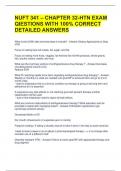NUFT 341 – CHAPTER 32-HTN EXAM
QIESTIONS WITH 100% CORRECT
DETAILED ANSWERS
What is the DASH diet and what does it include? - Answer-Dietary Approaches to Stop
HTN
Focus on eating less red meats, fat, sugar, and Na
Focus on eating more fruits, veggies, fat-free/low fat mil/milk products, whole grains,
fish, poultry, beans, seeds, and nuts
What are the 2 primary actions of antihypertensive drug therapy ? - Answer-Decrease
circulating blood volume (CO)
Reduce SVR
What Pt. teaching needs to be done regarding antihypertensive drug therapy? - Answer-
Weekly or monthly f/u visits are needed until goal BP is achieved then will go to 3 to 6
month visits
-need to emphasize this is a chronic condition so therapy is going to be long term and
adherence to it is essential
If experience any side effects or not reaching goal with present therapy another
classification will be used
- due to this emphasize need to report all side effects
What are common side effects of antihypertensive therapy? What education can be
provided to assist with managing these? - Answer-Orthostatic hypotension (get
up/change positions slowly)
Decreased libido or ED
Dry mouth (chews/suck on sugarless gum or candy)
Frequent voiding ( if taking a diuretic ensure to take it early in the day to avoid nocturia)
*need at least a week or so to adjust to pharmacological therapy —> if no change after
consider use of a different med*
Describe resistant HTN. - Answer-Failure to reach goal BP with appropriate therapy and
drug regimen
, This increases risk of stroke and MI
Treatment is based on determining the cause
What are potential causes of resistant HTN? - Answer-1. Psuedoresistant HTN causes
-Improper BP measurement
-inadequate drug doses
-inappropriate drug therapy
-poor adherence to drug regimen
-white coat syndrome
2. Volume overload causes
-excess Na intake
-volume retention from kidney disease
-inadequate diuretic therapy
-drug induced (corticosteroids, cyclosporine and tacrolimus, erythropoietin, illegal drugs,
licorice, NSAIDs, oral contraceptives, OTC drugs and herbs, sympathomimetics)
3. Associated conditions
-secondary HTN
-excess alcohol intake
-increased obesity
3. Drug induced or other causes
4. Associated conditions
Describe part of nursing assessment for HTN. - Answer-1. Obtain subjective data
-determine any PMHx of elevated BP, HTN, CVD, CVA, CKD,
hypothyroidism/hyperthryoidism, DM, pituitary d/o, obesity, dyslipidemia, menopause or
hormone replacement status
-determine use of any herbal, OTC, recreational, or prescription drugs (esp any
antihypertensives)
-Assess functional health patterns
* health perception-management: FMHx of HTN or CVD, tobacco se, sedentary
lifestyle, health literacy, readiness for change
*nutritional-metabolic: usual Na and fat intake, weight gain/loss
*elimination: nocturia
* activity-exercise: fatigue, DOE, palpitations, exterior ABL CP, intermittent
claudication, muscle cramps, usual pattern and type of exercise
*cognitive-perceptual: dizziness, blurred vision, paresthesia
* sexual-reproductive: ED, decreased libido
*coping-stress tolerance: stressful life events
2. Obtain objective data




